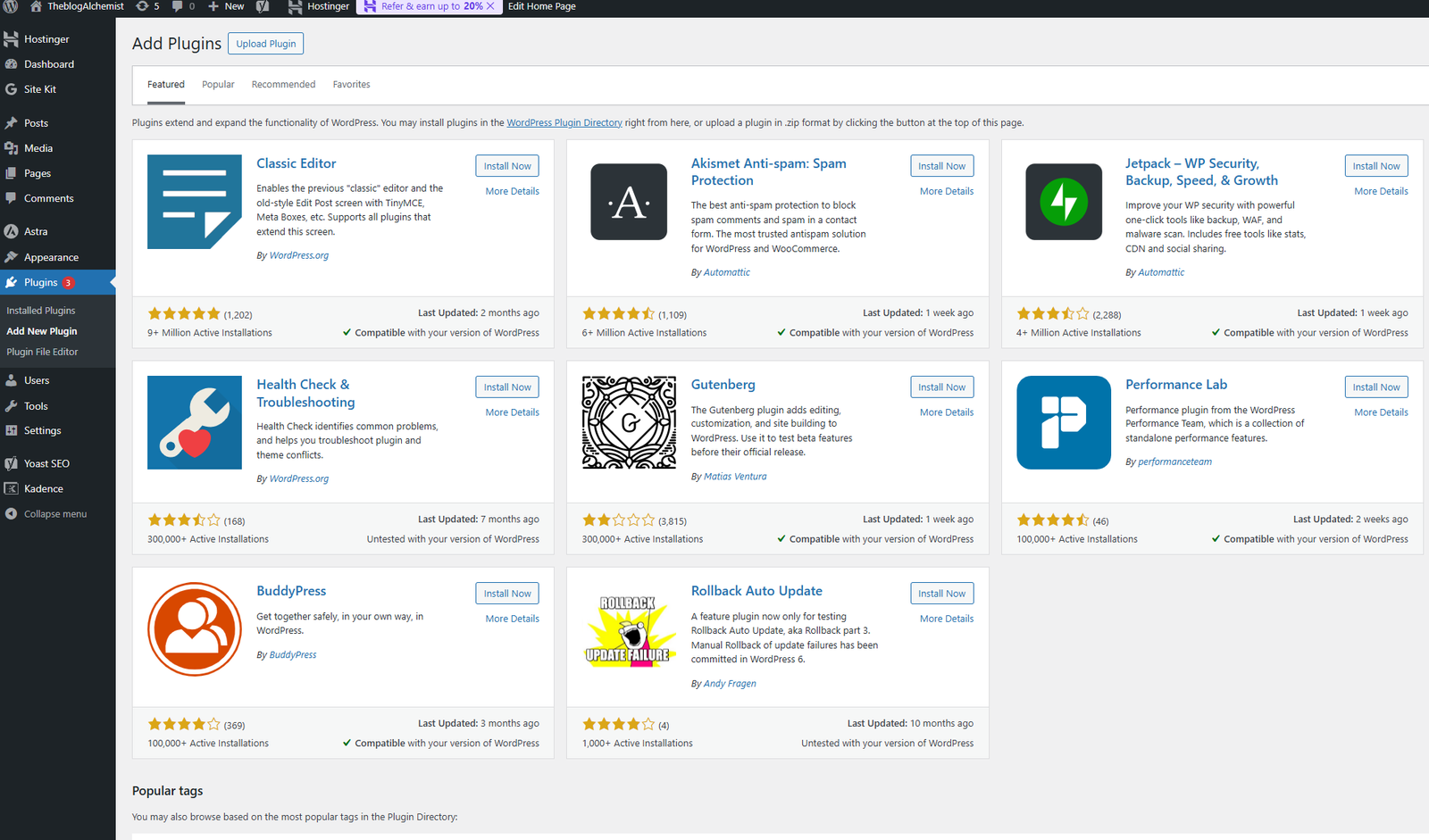
Are you looking to build a successful blog? Whether you’re a new blogger or an experienced one, selecting the best WordPress plugins is essential to optimizing your site for SEO, performance, security, and user engagement.
With so many plugins available, it’s easy to overload your site, which can slow down page speed and impact Core Web Vitals. In this guide, we’ll explore the must-have WordPress plugins for bloggers in 2025, ensuring your site stays fast, secure, and ranks higher in search results.
1. Best SEO Plugins for Bloggers
A well-optimized blog needs a solid SEO strategy. With the right tools, you can enhance your content’s visibility on search engines, drive organic traffic, and reach a wider audience.
Yoast SEO vs Rank Math vs SEOPress – Which One is Best?
| Feature | Yoast SEO | Rank Math | SEOPress |
|---|---|---|---|
| Free Version Available? | ✅ Yes | ✅ Yes | ✅ Yes |
| AI Content Analysis | ❌ No | ✅ Yes | ❌ No |
| Schema Markup Support | ✅ Yes | ✅ Yes | ✅ Yes |
| Redirect Manager | ✅ Premium Only | ✅ Free & Premium | ✅ Free & Premium |
| Social Media Preview | ✅ Yes | ✅ Yes | ✅ Yes |
Yoast SEO (Free & Premium)
One of the most widely used SEO plugins, Yoast SEO offers a comprehensive set of tools to help you improve your content’s readability and search rankings. The plugin provides real-time content analysis, keyword optimization, and XML sitemaps to ensure search engines can easily crawl your blog. Additionally, it assists with meta descriptions, title tags, and structured data support, making your content more discoverable.
🚀 Best for: Bloggers who want a straightforward and reliable SEO tool with extensive content analysis.
Rank Math (Free & Pro)
Rank Math is an alternative SEO plugin that offers a more intuitive interface and additional automation features. It includes AI-driven content analysis, 404 monitoring, and advanced schema markups to help structure your content better for search engines. Bloggers who want an all-in-one SEO tool often find Rank Math a great choice.
🚀 Best for: Bloggers looking for automation and AI-based SEO improvements.
SEOPress (Free & Pro)
SEOPress is another excellent SEO plugin that provides customizable metadata, redirects, XML and HTML sitemaps, and social media previews. It’s a great choice for bloggers who want a clean and lightweight plugin without unnecessary bloat.
🚀 Best for: Users who prefer a lightweight SEO plugin with powerful features.
2. Performance & Speed Optimization Plugins
Your blog’s speed plays a crucial role in user experience and SEO rankings. Slow-loading pages increase bounce rates, reducing engagement and revenue potential.
WP Rocket – The Ultimate Speed Optimization Plugin
WP Rocket is a premium caching plugin that optimizes your blog’s loading speed with minimal configuration. It implements page caching, lazy loading for images, and database optimization, ensuring your site remains fast.
🔍 Did you know? Google ranks faster websites higher in search results, and WP Rocket can improve site speed by up to 30%!
W3 Total Cache vs Asset CleanUp
| Feature | W3 Total Cache | Asset CleanUp |
| HTML, CSS, JS Minification | ✅ Yes | ✅ Yes |
| CDN Integration | ✅ Yes | ❌ No |
| Unused CSS & JS Removal | ❌ No | ✅ Yes |
3. Security & Backup Plugins
Security is critical for every blogger. Did you know that WordPress sites are attacked over 90,000 times per minute? Keeping your site secure ensures long-term growth and trust from readers.
Wordfence Security (Free & Premium)
Wordfence provides real-time firewall protection, malware scanning, and login security to keep your blog safe from hackers and unauthorized access.
💡 Pro Tip: Use Wordfence’s IP blocking feature to prevent repeated failed login attempts!
4. Content Creation & Engagement Plugins
Producing great content is only part of the blogging journey; engaging with readers ensures long-term success.
CoSchedule – Your Editorial Calendar & Marketing Hub
CoSchedule helps bloggers plan and schedule posts in advance. You can visually organize your editorial calendar and automate social media posting, saving time while maximizing engagement.
📌 Why It’s a Must-Have: If you struggle with consistency, CoSchedule keeps your blogging schedule on track.
Revive Old Posts – Drive Traffic to Older Content
Revive Old Posts automatically shares older blog posts to social media, ensuring continued visibility for evergreen content.
💡 Best for: Bloggers with a large content archive who want to maximize social traffic.
Smash Balloon Social Photo Feed
Smash Balloon lets you display Instagram, Facebook, and Twitter feeds directly on your blog. By integrating social media, you increase engagement and keep your audience connected across platforms.
📌 Best for: Bloggers who want seamless social media integration.
Easy Table of Contents
This plugin automatically generates a table of contents for long blog posts, making it easier for readers to navigate your content. It improves readability and enhances user experience.
💡 Best for: Bloggers who publish long-form content and want better on-page engagement.
Fluent Forms
An intuitive form builder that allows bloggers to create contact forms, surveys, and lead generation forms with ease. It integrates with major email marketing tools and CRMs.
🚀 Best for: Bloggers who want an easy-to-use yet powerful form builder for audience interaction.
WP Recipe Maker
For food bloggers, WP Recipe Maker formats and structures recipe content for SEO, making it easier for Google to display rich snippets and featured results.
📌 Best for: Food bloggers looking to optimize recipes for search visibility.
Better Click to Tweet
Encourage readers to share your content with click-to-tweet functionality, making social sharing effortless and increasing post engagement.
💡 Best for: Bloggers who want to encourage social media shares and interaction.
How to Install a WordPress Plugin
Installing a plugin in WordPress is simple and can be done in a few steps:
- Log in to your WordPress dashboard.
- Navigate to Plugins > Add New.
- Use the search bar to find the plugin you need.
- Click Install Now, then Activate.
- Configure the plugin settings according to your needs.
Best Practices for Using WordPress Plugins
Using WordPress plugins effectively ensures that your site remains optimized, fast, and secure while providing the best user experience. Here are some essential best practices to keep in mind:
- Only install the plugins you need. While WordPress plugins add functionality, installing too many can slow down your site and increase security risks. Be selective and keep only the essential ones that provide value.
- Keep plugins updated regularly. Plugin developers frequently release updates to fix security vulnerabilities and improve performance. Ensure that your plugins are always up to date to prevent compatibility issues and potential breaches.
- Test plugins before activating them. Some plugins can conflict with others, causing site errors or performance issues. Use a staging environment to test new plugins before applying changes to your live website.
- Remove inactive or outdated plugins. If a plugin is no longer maintained by its developer or hasn’t been updated for a long time, it could become a security risk. Regularly audit your installed plugins and remove those that are no longer needed.
- Monitor plugin performance. Some plugins consume a lot of resources, leading to slower page load times. Use tools like GTmetrix or Query Monitor to analyze plugin performance and identify any that might be negatively affecting your site’s speed.
- Download plugins from trusted sources. Always install plugins from reputable sources like the WordPress Plugin Repository or well-known third-party developers. Avoid downloading plugins from unverified sites, as they may contain malicious code.
- Backup your website before major plugin updates. Even a simple plugin update can sometimes cause unexpected issues. Having a reliable backup, using a tool like UpdraftPlus, ensures that you can restore your site quickly if something goes wrong.
By following these best practices, you can ensure that your WordPress plugins enhance your site’s functionality without compromising performance, security, or user experience.
Frequently Asked Questions (FAQ)
1. What are the must-have WordPress plugins for bloggers?
The essential plugins for bloggers include Yoast SEO, Rank Math, WP Rocket, Wordfence Security, CoSchedule, and Smash Balloon Social Photo Feed. These plugins help with SEO optimization, page speed, website security, content scheduling, and social media integration.
2. How do I choose the right WordPress plugins?
When selecting plugins, consider compatibility, impact on site speed, developer reputation, and reviews. Avoid installing too many plugins, as they can slow down your website and create security vulnerabilities.
3. Can too many plugins slow down my WordPress site?
Yes! Having too many plugins—especially poorly coded ones—can negatively impact Core Web Vitals, page load speed, and SEO rankings. Stick to lightweight, optimized plugins that fulfill essential functions.
4. What is the best SEO plugin for WordPress bloggers?
The best SEO plugins include Yoast SEO, Rank Math, and SEOPress. Rank Math provides AI-driven optimization, while Yoast is popular for its content readability features and structured data tools.
5. Are free WordPress plugins safe?
Most free plugins from the WordPress Plugin Repository are safe. However, always check for recent updates, active installations, and user ratings before installing. Using outdated or unverified plugins can create security risks.
6. What plugins help improve WordPress site speed?
To enhance page speed and performance, use WP Rocket, W3 Total Cache, Asset CleanUp, and Imagify for caching, minification, and image optimization.
7. How do I keep my WordPress plugins updated?
Enable automatic updates for trusted plugins or manually update them via Dashboard > Plugins. Always backup your site before updating to prevent plugin conflicts or potential downtime.
8. What’s the best plugin for securing a WordPress blog?
Wordfence Security and All In One WP Security provide firewall protection, malware scanning, and brute-force attack prevention to keep your website safe.
9. How can I integrate social media into my WordPress blog?
Use Smash Balloon Social Photo Feed to display Instagram or Facebook posts. Better Click to Tweet allows visitors to share your content easily, increasing social engagement and organic reach.
Final Thoughts
Selecting the right WordPress plugins is not just about adding functionality—it’s about enhancing your blog’s SEO performance, speed, security, and user engagement while maintaining a streamlined website. A well-optimized site will rank higher in search engines, provide a better user experience, and ultimately help your blog grow.
Balancing plugin performance and necessity is key. While it’s tempting to install numerous plugins, focus on those that provide essential features without slowing down your website. Regular updates, security monitoring, and performance audits should be part of your blogging routine to ensure everything runs smoothly.
With the right SEO plugins, your content will rank better on search engines, while performance optimization tools keep loading speeds fast. Security plugins help protect your site from vulnerabilities, and content engagement plugins keep readers coming back. Implementing best practices for plugin management will allow you to maximize benefits without compromising speed or security.
By staying up to date with emerging WordPress trends and plugin advancements, bloggers can continue to improve their site’s search visibility and user experience. The WordPress ecosystem is constantly evolving, and keeping up with the best tools will ensure your blog remains competitive in the years to come.
